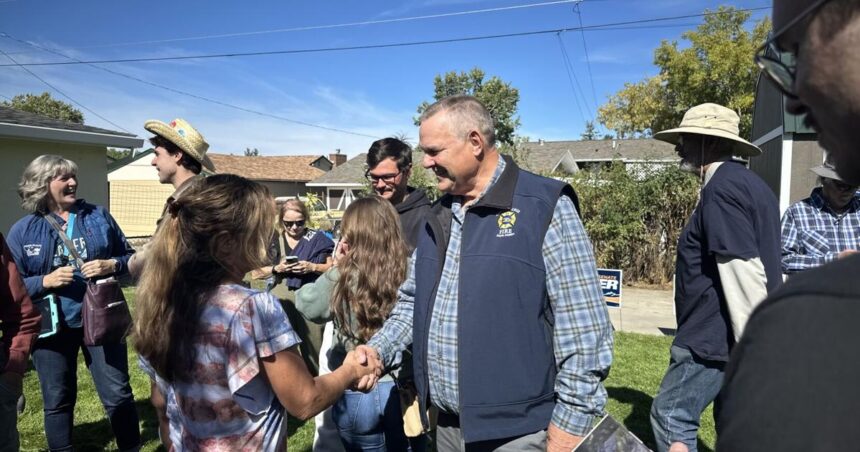The Crow community was still fuming over a leaked audio recording of Senate candidate Tim Sheehy talking about tribal members “drunk at 8 a.m.” when a new TV ad began circulating about “white farmers” being excluded from a federal farm aid program.
“They’re just saying it out loud, now,” Rae Peppers told herself in disbelief. The ad struck the Crow tribal member and former Democratic state legislator as blatant race-baiting, and it arrived as Tribal Chairman Frank White Clay was being pressured to call out Sheehy about a campaign anecdote that had offended many Indigenous Montanans.
Though the ad never identified the aid program, Peppers recognized it. The U.S. Department of Agriculture had set up a booth at Crow Native Days in June. Tribal members with small farm and ranch operations inquired about debt forgiveness. Peppers said she collected USDA literature to learn more about DFAP, short for Discrimination Financial Assistance Program. In the American West, the 228 Montana farmers who qualified for the assistance are second only to California’s 1,059, according to USDA data.
People are also reading…
Just as the ad said, Montana’s incumbent Democratic Sen. Jon Tester had voted for the program, twice, the second time to fix it. Senate Leadership Fund, Republican Senate Leader Mitch McConnell’s $124 million unaffiliated super PAC, used for supporting candidates and non-coordinated expenses, paid for the ad.
“You know, the USDA runs more than 60 direct and indirect programs for farm aid. And we’re talking about two, possibly just one, for Indians, farmers that have Indianness in them,” said Susan Webber, a member of the Blackfeet Tribe. Webber, a Democrat, serves on the Agriculture Committee in the state Senate. “They [non-Indigenous farmers] get direct payments, they get crop insurance. In 2019 they received $22 billion in government payments. Indians don’t get that.
“The average market value for products sold by a Native American-owned farm is around $50,000 a farm, compared to white-owned farms and ranches, which is approximately $187,000. They’re not the big conglomerates,” Webber said of Indigenous farmers. “They’re just regular farmers. Really, it confirms that Native Americans are just eking out a living. And the commercial has these white disadvantaged farmers saying they’re disadvantaged? They got $22 billion.”
Montana ranks 18th nationally as a recipient of farm aid, according to the Environmental Working Group, a subsidy watchdog. Payments to Montana farmers in 2023 totaled $450 million, with crop insurance accounting for 48%. Ten different programs issued payments to 20,377 applicants, some of whom are counted in more than one program. Two of them are featured in the “white farmer” ad. Still, 61% of Montana farmers received no subsidy.
In eastern Montana, where 82% of the state’s agricultural products are produced, the 2022 ag census counted 640 Indigenous farmers and 29,053 white farmers.
The Discrimination Financial Assistance Program wasn’t a slam dunk for Congress. The first version — the one referenced by McConnell’s leadership fund ad, stalled in court. The $4 billion program was part of the American Rescue Plan, which passed in March 2021.
Scott Wynn, a white farmer in Florida, sued USDA because he didn’t qualify under DFAP’s race-specific loan forgiveness terms, which were designed to address generations of racial injustice in American farm policy. The U.S. District Court, Middle Florida District, blocked the program before it started. Later, Wynn prevailed.
Congress then retooled the program and passed a smaller version within the Inflation Reduction Act in late summer 2022. The terms were broadened to accommodate non-racial forms of discrimination. Tester voted for the Inflation Reduction Act.
The decades-old backstory of the loan-forgiveness program’s funding involves lawsuits filed by minority farmers who suffered decades of discrimination. For Indigenous farmers, the case was George and Marilyn Keepseagle v. Agriculture Secretary Tom Vilsack. The Standing Rock Sioux couple proved that because of race they had been denied low-interest loans and other USDA services. The government settled, agreeing to forgive $80 million in loans, while also paying $680 million in damages to 3,600 Indigenous farmers. Two years before Keepseagle was filed, Black farmers sued on the same grounds in Timothy Pigford v. Agriculture Secretary Dan Glickman, leading to a $1.06 billion settlement for nearly 16,000 Black farmers.





